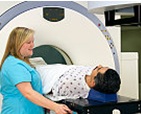Pavilion Publishing and Media Ltd
Blue Sky Offices Shoreham, 25 Cecil Pashley Way, Shoreham-by-Sea, West Sussex, BN43 5FF, UNITED KINGDOM
 Using an MRI scan to help diagnose prostate cancer could spare some men from unnecessary invasive biopsies, according to a new study. The technique could also help spot the difference between aggressive prostate cancers and tumours that would never cause any harm during a man’s lifetime, avoiding so-called ‘overdiagnosis’.
Using an MRI scan to help diagnose prostate cancer could spare some men from unnecessary invasive biopsies, according to a new study. The technique could also help spot the difference between aggressive prostate cancers and tumours that would never cause any harm during a man’s lifetime, avoiding so-called ‘overdiagnosis’.
According to lead author Dr Hashim Ahmed, from University College London Hospitals, such mistaken diagnoses are due to the fact that traditional tissue samples (biopsies) are often unable to distinguish between harmless and aggressive cancers.
“Our current biopsy test can be inaccurate because the tissue samples are taken at random,” said Ahmed. “This means it cannot confirm whether a cancer is aggressive or not and can miss aggressive cancers that are actually there.”
The latest study, published in The Lancet, looked at 576 men across 11 UK hospitals. The researchers tested whether a type of MRI scan, called MP-MRI, could more accurately identify men with aggressive forms of the disease than the standard biopsy test. MP-MRI scans can give information about the tumour’s size, how densely packed its cells are and how well connected to the bloodstream it is, which may help tell apart harmless cancers and those that need further tests.
Of men who were found to have an aggressive form of the disease, the standard biopsy picked up less than half (48%) of these cases, whereas MP-MRI identified 93%. The findings also indicate that using the scan could reduce unnecessary biopsies and help avoid picking up prostate cancers that wouldn’t have caused any problems.
Professor Malcolm Mason, a Cancer Research UK prostate cancer expert, said the findings suggest that the NHS should begin to consider MP-MRI for prostate cancer diagnosis. But he cautioned that despite the technique becoming more widely available, attempting to introduce it in the health service “will likely require a big investment”.
“This important study highlights a potential way to improve how prostate cancer is diagnosed. The main challenge for the health service would be how to incorporate this kind of MRI – which requires modern equipment – into hospitals.”
The health service is facing continued pressure to adopt new technology like this, said Sara Bainbridge, Cancer Research UK’s policy manager. “Cancer tests of all kinds, and the staff who deliver and interpret them, are under pressure – and we know that demand is only going to increase with an ageing population and innovations like the one suggested in this study. Health Education England are reviewing the cancer workforce as part of the cancer strategy in England. This review must include action to boost numbers of staff who are involved in diagnostics so that there are enough health professionals in the future to diagnose cancer earlier and better.”



Comments are closed.